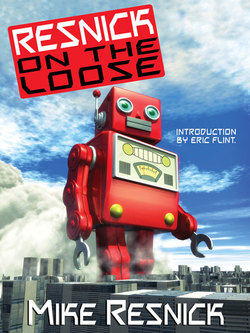Читать книгу Resnick on the Loose - Mike Resnick - Страница 10
На сайте Литреса книга снята с продажи.
ОглавлениеRevealed Falsehoods
Over the past century, the giants of science fiction have occasionally written a line or two that somehow survives them and their work, and is eventually viewed by most members of the field as a Revealed Truth.
Being a natural-born cynic (well, Caesarian actually, but let it pass), I’m here to tell you that Truth, revealed or otherwise, never set anyone free. It is Doubt that sets people free.
You think not? Let’s examine some of these truths that science fiction readers and writers seem to think are immutable.
And let’s start with one that even non-science-fiction people like to quote: Isaac Asimov’s First Law of Robotics, which states that a robot cannot harm a human being, or through inaction allow harm to come to a human being.
Sounds sensible. Of course we’ll build that into every robot we ever make. Everyone knows that.
Uh…well, maybe not quite everyone. Seems to me that in 1991, the entire world saw a smart bomb, which is nothing but a robot in other-than-humanoid form, find its way down an Iraqi chimney. In 2003, we saw the Navy fire a smart bomb into the air while at sea, and the bomb, using its (non-positronic) brain, found its target 450 miles away.
So much for First Law.
Then there’s TANSTAAFL—the war cry of fans in the 1960s and 1970s, which was Robert A. Heinlein’s acronym for “There ain’t no such thing as a free lunch,” a battle cry voiced in The Moon is a Harsh Mistress.
But of course it’s ridiculous. There are free lunch programs all the hell over. Check your local school. Or look at New York, where Mayor Michael Blumberg has just proposed not only free lunches, but cash payments to poor people who don’t break the law, to parents who actually read their kids’ report cards, to kids who obey the law by attending school, and so on.
If there ain’t no such thing as a free lunch, it’s only because it’s been surpassed by a couple of hundred more lucrative free things.
Okay, let’s go back to one of the fathers of science fiction, H. G. Wells. Wells explained, time and again, that the proper way to write science fiction was to take one, and only one, scientific breakthrough and write a story around it, that the public couldn’t possibly buy more than one a book.
Sounds logical…but it’s dumb. It presupposes that the 1950s public couldn’t deal with, say, jet planes, television, and the Salk polio vaccine at the same time, or that no 1990s story proposing space flight, cell phones, AIDS medications, and DVDs could be assimilated by the man (or reader) on the street.
And another revealed truth bites the dust.
Sir Arthur C. Clarke states that “Any sufficiently advanced technology is indistinguishable from magic.” The only answer is: to whom? Not to the people who create it. Not to the people who apply it. Not to all the people who benefit from it. (I love the late George Alec Effinger’s response to reading about faster-than-light drives and zap guns and all the other tropes of science fiction that some misguided authors feel they must explain, at length, in their stories: “Any sufficiently advanced technology is indistinguishable from doubletalk.”)
Then there’s Damon Knight’s classic definition of science fiction: “Science fiction is what I’m pointing at when I say ‘That’s science fiction.’”
Witty as all get-out. Great line at parties. But I’ve been hearing it quoted as something meaningful for more than four decades now. Let’s try an experiment: substitute the word “Jabberwocky” or any other nonsense word of your choice. Seems just as brilliant (and just an uninformative), doesn’t it?
Then there’s Robert E. Howard’s classic and oft-quoted line (though of course Nietzsche said it first): “That which does not kill us makes us stronger.” Sure sounds good. But maybe you should ask a quadriplegic car crash survivor, or someone who’s just lost a lung and a kidney to cancer, if they think they’re any stronger because of what didn’t kill them.
Sturgeon’s Law—“90% of everything is crap”—is so famous that even the New York Times has quoted it. I’d have no problem with it if it were limited to television, movies, and Windows Vista, but it’s all-inclusive, and your brain would surely qualify for Sturgeon’s 90% if you believed 90% of all medical and technological breakthroughs (or Baen books, for that matter) were crap.
Back to Isaac Asimov, whose second most famous statement is “Violence is the last resort of the incompetent.” Which may very well be true, but doesn’t acknowledge the far more meaningful corollary, which is that the competent don’t wait that long.
I’m sure you can think of more of science fiction’s Revealed Falsehoods and Half-Truths, but you get the idea. Even in a field as cerebral and forward-looking as ours, we pay lip service to a lot of lines that sound brilliant but hold about as much water as a sieve.
So the next time someone comes up to you and proves how brilliant we are by quoting an unquestioned statement by one of our leading lights, make sure you’re within reach of the saltcellar, because you’re going to have to take what they tell you with a few grains of sodium chloride.
